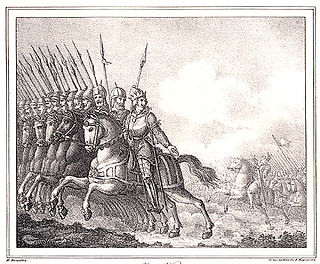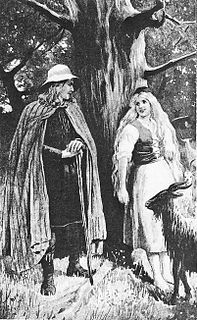
Hrólfr Kraki, Hroðulf, Rolfo, Roluo, Rolf Krage was a legendary Danish king who appears in both Anglo-Saxon and Scandinavian tradition.

Hrothgar is portrayed in medieval sources as a Danish king living around the early sixth century CE.
Fróði is the name of a number of legendary Danish kings in various texts including Beowulf, Snorri Sturluson's Prose Edda and his Ynglinga saga, Saxo Grammaticus' Gesta Danorum, and the Grottasöngr. A Danish king by this name also appears as a minor character in the Middle High German epic Die Rabenschlacht. The name is possibly an eponym for the god Freyr.

Eadgils, Adils, Aðils, Adillus, Aðísl at Uppsölum, Athisl, Athislus or Adhel was a semi-legendary king of Sweden, who is estimated to have lived during the 6th century.

Yrsa, Yrse, Yrs or Urse was a tragic heroine of early Scandinavian literature.
Onela was according to Beowulf a Swedish king, the son of Ongentheow and the brother of Ohthere. He usurped the Swedish throne, but was killed by his nephew Eadgils, who won by hiring foreign assistance.
Old English Scylding and Old Norse Skjöldung, meaning in both languages "People of Scyld/Skjöld" refers to members of a legendary royal family of Danes, especially kings. The name is explained in many texts, such as Friedrich Christoph Dahlmann's 'Research on the Field of History', by the descent of this family from an eponymous king Scyld/Skjöld. But the title is sometimes applied to rulers who purportedly reigned before Scyld/Skjöld and the supposed king Scyld/Skjöld may be an invention to explain the name. There was once a Norse saga on the dynasty, the Skjöldunga saga, but it survives only in a Latin summary by Arngrímur Jónsson.

Halfdan was a late 5th and early 6th century legendary Danish king of the Scylding (Skjöldung) lineage, the son of king named Fróði in many accounts, noted mainly as the father to the two kings who succeeded him in the rule of Denmark, kings named Hroðgar and Halga in the Old English poem Beowulf and named Hróar and Helgi in Old Norse accounts.

Wealhþēow is a queen of the Danes in the Old English poem, Beowulf, first introduced in line 612.
The Heaðobards were possibly a branch of the Langobards, and their name may be preserved in toponym Bardengau, in Lower Saxony, Germany.
Skuld was a princess of Scandinavian legend who married Heoroweard and encouraged him to kill Hroðulf. The accounts of her vary greatly from source to source. Skuld is derived from the Old Norse verb skulla, "need/ought to be/shall be"; its meaning is "that which should become, or that needs to occur".

Beowulf & Grendel is a 2005 film Canadian-Icelandic fantasy adventure film directed by Sturla Gunnarsson, loosely based on the Anglo-Saxon epic poem Beowulf. It stars Gerard Butler as Beowulf, Stellan Skarsgård as Hrothgar, Ingvar Eggert Sigurðsson as Grendel and Sarah Polley as the witch Selma. The screenplay was written by Andrew Rai Berzins. The soundtrack was composed by Hilmar Örn Hilmarsson. While some of the film remains true to the original poem, other plot elements deviate from the original poem: four new characters, Grendel's father, the witch Selma, Father Brendan, and Grendel's son are introduced, and several related plot points were developed specifically for the film.
Ingeld or Ingjaldr was a legendary warrior who appears in early English and Norse legends. Ingeld was so well known that, in 797, Alcuin wrote a letter to Bishop Higbald of Lindisfarne questioning the monks' interest in heroic legends with: 'Quid enim Hinieldus cum Christo?' - What has Ingeld to do with Christ?
Hreðric and Hroðmund were the sons of the Danish king Hroðgar and his queen, Wealhþeow, in the Old English epic Beowulf. They are only mentioned in passing, and there seems to be some foreshadowing in Beowulf that their cousin, Halga's son Hroðulf, i.e. Hrólfr Kraki, would usurp the throne from them.
Valdar was the name of several legendary Danish kings.
Hrólfs saga kraka, the Saga of King Hrolf Kraki, is a late legendary saga on the adventures of Hrólfr Kraki and his clan, the Skjöldungs. The events can be dated to the late 5th century and the 6th century. A precursor text may have dated to the 13th century, but the saga in the form that survived to this day dates to ca. 1400. 44 manuscripts survive, but the oldest one of them is from the 17th century, although a manuscript is known to have existed c. 1461 at the monastery of Möðruvellir in Iceland.






